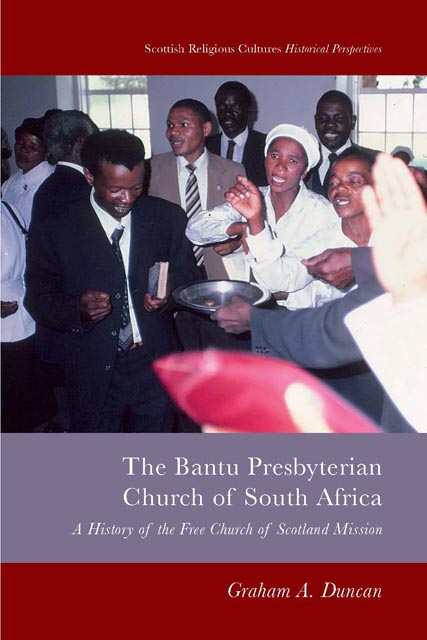Book contents
- Frontmatter
- Contents
- Acknowledgements
- Timeline
- A Presbyterian Anthem
- Introduction
- 1 Background to this Study
- 2 The Origins and Early Development of Scottish Presbyterian Mission in South Africa, 1824–65
- 3 Rev. Tiyo Soga (1829–71): A Paragon of Early Indigenous Leadership
- 4 The Role of Mission Councils in the Scottish Mission in South Africa, 1864–1923
- 5 The Rev. Edward Tsewu’s Dispute with the Free Church of Scotland Mission
- 6 The Mzimba Secession, 1898: A South African ‘Disruption’
- 7 Presbyterianism in South Africa, 1897–1923: To Unite orNot to Unite?
- 8 Preparations for the Formation of the Bantu Presbyterian Church of South Africa, 1897–1919
- 9 The Formation of the Bantu Presbyterian Church of South Africa, 1920–3
- 10 Mission to Church – Church to Mission: The First Ten Years, 1923–33
- 11 Reaching Out: The Bantu Presbyterian Church in South Africa and the Presbyterian Church of South Africa and Ecumenism, 1923–39
- 12 The Bantu Presbyterian Church in South Africa and Ecumenism, 1940–99
- 13 The End of Mission Councils: The Church of Scotland South Africa Joint Council, 1971–81
- 14 A Young Church in Mission or Maintenance Mode?: The Bantu Presbyterian Church of South Africa, 1923–99
- 15 The Bantu/Reformed Presbyterian Church and Socio-political Issues
- 16 Bantu/Reformed Presbyterian ChurchWomen in Leadership in Ministry
- Conclusion: Indigenous Presbyterians and Missionaries –Transferring Contending Roles and Responsibilities
- Bibliography
- Index
6 - The Mzimba Secession, 1898: A South African ‘Disruption’
Published online by Cambridge University Press: 26 November 2022
- Frontmatter
- Contents
- Acknowledgements
- Timeline
- A Presbyterian Anthem
- Introduction
- 1 Background to this Study
- 2 The Origins and Early Development of Scottish Presbyterian Mission in South Africa, 1824–65
- 3 Rev. Tiyo Soga (1829–71): A Paragon of Early Indigenous Leadership
- 4 The Role of Mission Councils in the Scottish Mission in South Africa, 1864–1923
- 5 The Rev. Edward Tsewu’s Dispute with the Free Church of Scotland Mission
- 6 The Mzimba Secession, 1898: A South African ‘Disruption’
- 7 Presbyterianism in South Africa, 1897–1923: To Unite orNot to Unite?
- 8 Preparations for the Formation of the Bantu Presbyterian Church of South Africa, 1897–1919
- 9 The Formation of the Bantu Presbyterian Church of South Africa, 1920–3
- 10 Mission to Church – Church to Mission: The First Ten Years, 1923–33
- 11 Reaching Out: The Bantu Presbyterian Church in South Africa and the Presbyterian Church of South Africa and Ecumenism, 1923–39
- 12 The Bantu Presbyterian Church in South Africa and Ecumenism, 1940–99
- 13 The End of Mission Councils: The Church of Scotland South Africa Joint Council, 1971–81
- 14 A Young Church in Mission or Maintenance Mode?: The Bantu Presbyterian Church of South Africa, 1923–99
- 15 The Bantu/Reformed Presbyterian Church and Socio-political Issues
- 16 Bantu/Reformed Presbyterian ChurchWomen in Leadership in Ministry
- Conclusion: Indigenous Presbyterians and Missionaries –Transferring Contending Roles and Responsibilities
- Bibliography
- Index
Summary
Introduction
A significant stimulus to the formation of an autonomous church whose roots were in the Scottish mission was the rise of resistance to mission domination in the latter part of the nineteenth century. This was an African continental phenomenon and took the form of Ethiopian-type churches whose origin and development were a paradoxical phenomenon in the history of Christianity in South Africa. They expressed the success of missionary work which had prepared African leadership through providing a thorough education which resulted in the twin, but opposing responses, of conformity and resistance. The organisers of what became Ethiopian-type churches were resisters, although some appeared to be conformists. On the other hand, the missionaries lamented their rise because they undermined their power and authority and suggested that they had outgrown their missionary purpose with the developing maturity of their scions. The missionaries had seriously underestimated the option of rejection of their mentorship in whole, or in part as they reached spiritual and other forms of maturity. Missionaries believed that their subjects were not yet fully equipped for the responsibility some were taking upon themselves, but could give no reasonable estimate regarding when that state of ‘readiness’ would occur. History has not been kind to this interpretation as several such churches arose and many have survived the dismal prediction that they would not stand the test of time.
Prelude to Secession
One such example is the Presbyterian Church of Africa which came into being when Rev. Pambani J. Mzimba, an experienced minister and one of the first blacks to be ordained by the Free Church of Scotland Mission in South Africa, seceded from the mission in 1898. Mzimba had been minister of the Free Church of Scotland Mission at Lovedale adjacent to the historic Lovedale Missionary Institution since his ordination in 1875. He had received his education and had worked at Lovedale, before his ordination. In 1893, he was sent to Scotland to attend the jubilee celebrations of the Free Church of Scotland as a representative of the Mission. While there, Mzimba raised a large sum of money for a building fund in his congregation supported by Dr James Stewart, his mentor and Principal of Lovedale Missionary Institution (Burchell 1979: 120).
- Type
- Chapter
- Information
- Bantu Presbyterian Church of South AfricaA History of the Free Church of Scotland Mission, pp. 71 - 84Publisher: Edinburgh University PressPrint publication year: 2022



